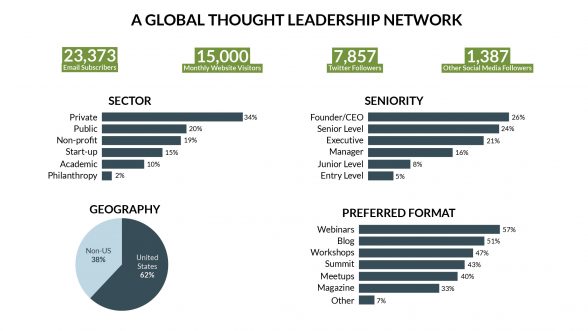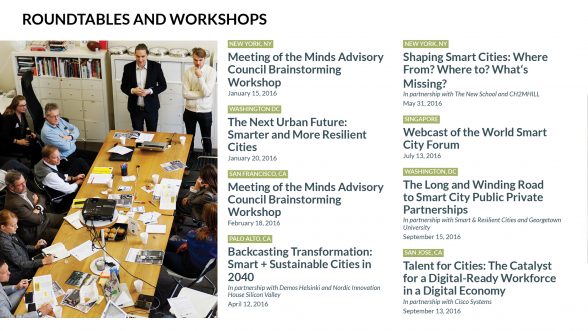Released today: Meeting of the Minds Annual Report

Who will you meet?
Cities are innovating, companies are pivoting, and start-ups are growing. Like you, every urban practitioner has a remarkable story of insight and challenge from the past year.
Meet these peers and discuss the future of cities in the new Meeting of the Minds Executive Cohort Program. Replace boring virtual summits with facilitated, online, small-group discussions where you can make real connections with extraordinary, like-minded people.
We are excited to release our 2016 Annual Report with results from all our year-round programming. I think you will find the Annual Report helpful as you think about Meeting of the Minds’ impact in 2016 and how to engage with the Meeting of the Minds global leadership network in 2017 and beyond.
Inside the report, you’ll find interesting statistics and summaries related to the events and resources that we organized over the last 12 months. Webinar attendance was particularly strong this year, and user surveys consistently placed webinars and other digital resources (such as the CityMinded.org blog) as some of the most important formats we provide.
Download the 2016 Annual ReportA survey of our network also allowed us to pinpoint the most urgent topics, challenges, and opportunities for leaders working in urban sustainability, innovation and connected technology.
In addition to our digital resources, Meeting of the Minds organized a number of in-person workshops and roundtables, all of which are summarized in this report.
In the second half of 2016, we took a temporary break from our monthly meetups. The meetup.com group continued to grow, however, and our sister meetups in New York and Detroit continued to meet. After many requests for the events to return, we restarted our monthly San Francisco urban sustainability meetups this month. Our next meetup will be February 2nd – more info here.
These are just a few of the pages, summaries and statistics available in the Annual Report. Please download your copy and continue to engage with us throughout 2017.
Discussion
Leave your comment below, or reply to others.
Please note that this comment section is for thoughtful, on-topic discussions. Admin approval is required for all comments. Your comment may be edited if it contains grammatical errors. Low effort, self-promotional, or impolite comments will be deleted.
Read more from MeetingoftheMinds.org
Spotlighting innovations in urban sustainability and connected technology
Middle-Mile Networks: The Middleman of Internet Connectivity
The development of public, open-access middle mile infrastructure can expand internet networks closer to unserved and underserved communities while offering equal opportunity for ISPs to link cost effectively to last mile infrastructure. This strategy would connect more Americans to high-speed internet while also driving down prices by increasing competition among local ISPs.
In addition to potentially helping narrow the digital divide, middle mile infrastructure would also provide backup options for networks if one connection pathway fails, and it would help support regional economic development by connecting businesses.
Wildfire Risk Reduction: Connecting the Dots
One of the most visceral manifestations of the combined problems of urbanization and climate change are the enormous wildfires that engulf areas of the American West. Fire behavior itself is now changing. Over 120 years of well-intentioned fire suppression have created huge reserves of fuel which, when combined with warmer temperatures and drought-dried landscapes, create unstoppable fires that spread with extreme speed, jump fire-breaks, level entire towns, take lives and destroy hundreds of thousands of acres, even in landscapes that are conditioned to employ fire as part of their reproductive cycle.
ARISE-US recently held a very successful symposium, “Wildfire Risk Reduction – Connecting the Dots” for wildfire stakeholders – insurers, US Forest Service, engineers, fire awareness NGOs and others – to discuss the issues and their possible solutions. This article sets out some of the major points to emerge.
Innovating Our Way Out of Crisis
Whether deep freezes in Texas, wildfires in California, hurricanes along the Gulf Coast, or any other calamity, our innovations today will build the reliable, resilient, equitable, and prosperous grid tomorrow. Innovation, in short, combines the dream of what’s possible with the pragmatism of what’s practical. That’s the big-idea, hard-reality approach that helped transform Texas into the world’s energy powerhouse — from oil and gas to zero-emissions wind, sun, and, soon, geothermal.
It’s time to make the production and consumption of energy faster, smarter, cleaner, more resilient, and more efficient. Business leaders, political leaders, the energy sector, and savvy citizens have the power to put investment and practices in place that support a robust energy innovation ecosystem. So, saddle up.











0 Comments